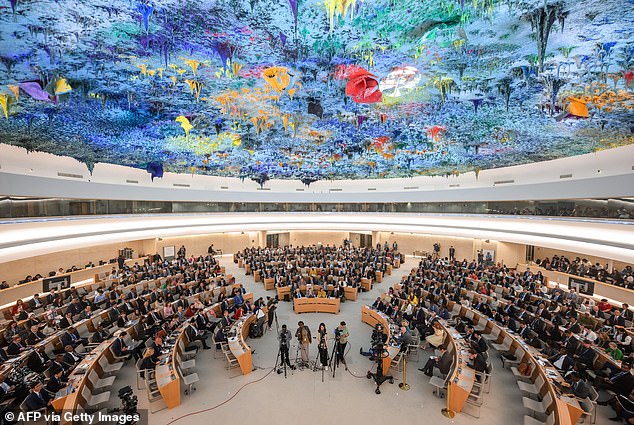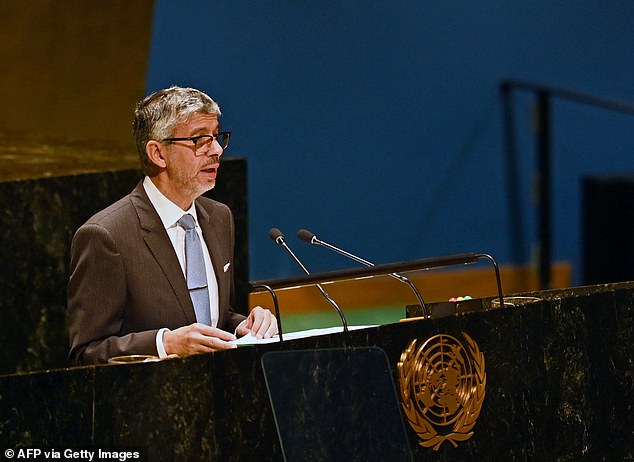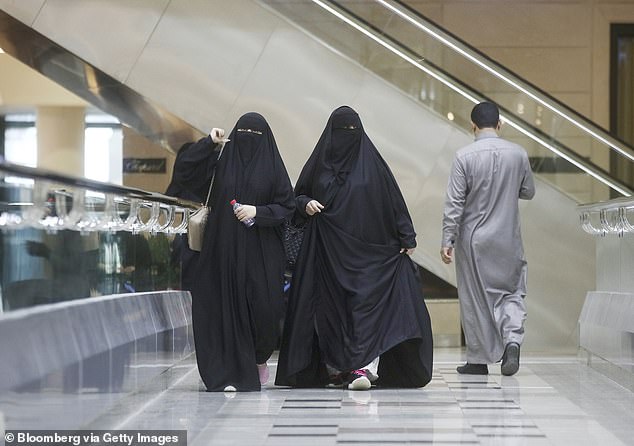Saudi cartoonist is jailed 23 years for satirical drawings that ‘insulted the kingdom’s leaders’
A Saudi artist has been sentenced to more than 20 years in prison for political cartoons that allegedly insulted the Gulf kingdom’s leadership, his sister and a rights group said this week.
The case against 48-year-old Mohammed al-Hazza adds to concerns about freedom of expression under Crown Prince Mohammed bin Salman, as Saudi Arabia – the world’s largest crude oil exporter – tries to open up after years of isolation for tourists and investors.
The father of five was arrested in Saudi Arabia in February 2018 in a “violent raid” in which security forces forced their way into his home and ransacked his studio, the London-based Sanad Human Rights Organization said in a statement.
A court document seen by AFP says the charges against him include “offensive cartoons” he produced for the Qatari newspaper Lusail, as well as social media posts that were allegedly “hostile” to Saudi Arabia and supportive of Qatar.
Hazza’s arrest came less than a year after Saudi Arabia and several allies cut ties with Qatar, claiming it supported extremists and was too close to Iran – accusations Doha denied. The countries restored ties in January 2021.
Saudi Crown Prince Mohammed bin Salman attends a meeting in Riyadh, Saudi Arabia, September 11, 2024

At least 208 people have been put to death in the Middle East so far this year, surpassing the most recent record of 196 in 2022, with almost three months left in the calendar.
Saudi Arabia’s Specialized Criminal Court, which was established in 2008 to handle terrorism-related cases, initially sentenced Hazza to six years in prison.
But this year, as Hazza prepared to be released, the case was reopened and he was sentenced to 23 years, his sister Asrar al-Hazza told AFP by telephone from the United States.
“He was almost there… He almost left prison. But then out of the blue it was opened again and that lasted 23 years,” she said.
Saudi authorities did not immediately respond to a request for comment on the case on Wednesday.
Sanad said in his statement that Hazza worked for Lusail mainly before the 2017 boycott “and only shortly after” and that most of his cartoons concerned domestic Qatari issues.
The group said prosecutors presented no evidence of cartoons offensive to Saudi Arabia or social media posts supporting Qatar during the boycott.
Under Crown Prince Mohammed bin Salman, Saudi Arabia has been criticized for what activists describe as a fierce crackdown on even vaguely critical online speech.
Over the past two years, the Saudi judiciary has convicted “dozens of individuals and imposed lengthy prison sentences for their statements on social media,” human rights groups Amnesty International and ALQST said in April.
Saudi officials say the suspects committed terrorism-related crimes.
“The case of Mohammed al-Hazza is an example of the suppression of freedom of expression in Saudi Arabia, where no one has been spared, including artists,” Sanad operations manager Samer Alshumrani told AFP.
“This is supported by the politicized, non-independent judiciary in Saudi Arabia.”
Al-Hazza’s sentence comes days after Saudi Arabia was denied a seat on the UN Human Rights Council.
The Saudi Arabian government has continued to try to present itself as a reformed country that has made progress in gender equality and human rights.
But the kingdom has carried out a record number of executions this year under Crown Prince Mohammed; in 2024, at least 208 people were put to death in the Middle East.
Since taking over as crown prince in 2015, Salman has overseen at least 1,447 executions and despite a mortar over the use of the death penalty for minor crimes in 2020, capital punishment cases reached a monthly record of 41 in August. and 32 last month.
The brutal regime has also handed out long prison sentences to several women, often in secret trials, after they were caught using social media to advocate for greater rights and freedoms for women.
One of those women, 30-year-old Manahel al-Otaibi, was sentenced to 11 years in prison for “terrorist crimes” after the Saudi Arabian fitness instructor posted messages about women’s empowerment online.

The United Nations Human Rights Council in Geneva. The dire figures come as the UN prepares to vote tomorrow on whether the Gulf state should be granted membership of the Human Rights Council.

Manahel al-Otaibi, 30, was jailed for 11 years after posting about women’s empowerment on social media

Saudi Arabia’s envoy to the UN, Abdulaziz Alwasil (photo), was elected chairman of the Commission on the Status of Women (CSW) in a completely unopposed race.

Saudi Arabia has a shocking record on gender equality (File Image)
Earlier this month, Manahel told her family that she had been stabbed in the face with a sharp pen and that stitches were needed, but when her family tried to report the attack to the Saudi government’s Human Rights Commission, they were reportedly ignored.
Yet in March, Saudi Arabia was elected to chair a UN commission aimed at promoting gender equality and empowering women.
To the consternation of human rights groups around the world, Saudi envoy to the UN, Abdulaziz Alwasil, was elected chair of the Commission on the Status of Women (CSW) in an unopposed election at the group’s annual meeting in New York.
He was even supported by a group of Asia-Pacific states on the commission, despite his country’s infamous record on gender equality, which human rights groups were quick to point out.
Louis Charbonneau, UN director of Human Rights Watch, said at the time: “Saudi Arabia’s election as chair of the UN Commission on the Status of Women shows a shocking disregard for women’s rights around the world.
“A country that jails women simply for standing up for their rights should not be the face of the UN’s top forum for women’s rights and gender equality.
“The Saudi authorities must demonstrate that this honor was not entirely undeserved and immediately release all detained women’s rights defenders, end male guardianship and guarantee women’s full rights to equality with men.”
Saudi lawmakers passed a law in 2022 that claims to have increased the “personal status” of women in the country.
But the law explicitly says that a woman must obtain permission from a male guardian to marry.
It also states that a wife must obey her husband in a “reasonable manner,” and states that her husband’s financial support depends on her “obedience.”
A spouse can withdraw financial support for reasons such as refusing to have sex with him, live in a marital home, or travel with him without a “legitimate excuse.”
